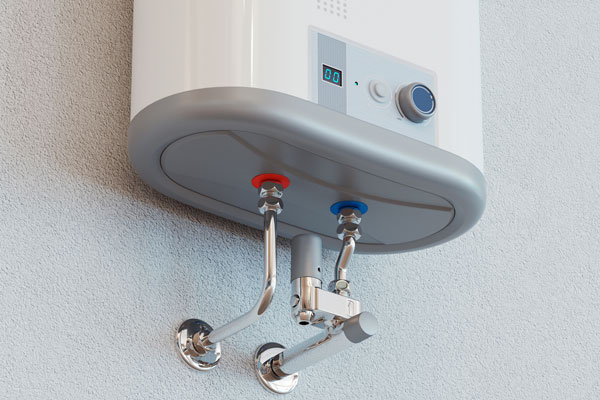To tank, or not to tank? That is the question. A water heater is a very important appliance in the best of times, but during this seemingly endless cold snap we’ve had, it has become all the more crucial. If it is time to replace your current system or you are just considering an alternative method, there is a lot that will go into your decision. As we all know, a new water heater is a big investment, so we want it to be worth it. Essentially, what it comes down to is reliability, longevity and cost. Which one will save me money in the long run? Which will last long enough to make my investment worth it? And which will provide a reliable source of hot water for my home? We have compiled a list of pros and cons for you to consider so you can make the best decision for your home.
First off, some of you may be wondering, how does a tankless water heater work without a tank of stored, hot water? A tankless water heater is an “on-demand” heating system. When you open the hot water tap a sensor will detect incoming water, activating the chosen energy source (i.e. gas or electric) that will immediately heat the water passing through until the tap is closed again. The result is almost instant hot water. Sounds amazing, right? No more waiting for that piping hot shower in the morning! But, before you go ahead ordering the tankless system, take a look at our pros and cons list. It will help you make an educated choice.
Pros and Cons
1. Reliability
- A tankless water system gives you instant hot water BUT it struggles with competing outlets.
- A tanked system will heat several sources at once BUT it has a limited supply before it needs to heat the tank again.
If your family has several people showering consecutively, the new tankless model will be nice to have, as each person will get hot water in their shower, the “on-demand” system will keep heating until the last person is clean. However, if your family has multiple showers going at once, or the dishwasher or washing machine is running too, the tankless system will struggle to maintain heat for all of those outlets and will most likely result in inconsistent temperatures. Whereas a traditional water tank will easily heat all those outlets at once, but when the hot water is out (cold shower city!) you will need to wait until the tank can heat its stored water up again.
2. Cost
- A tankless will save you money on your monthly energy bills BUT the upfront cost is high and the payback might take awhile.
- A tanked system does not cost as much to install BUT the endless energy usage is not only costly its not as environmentally conscience either.
The newer tankless system uses less energy because it only fires up when it is in use, whereas the traditional tank system endlessly heats the stored water so it is ready whenever needed. The water tank system is also susceptible to the weather and works exceptionally hard in these winter months to constantly maintain that hot water in the tank when the temperature is freezing all around it. Also, consider that the new tankless system does have the high initial price tag, especially if you are going from tank to tankless because the plumbing is different. To compensate though, remember that you will save on monthly bills due to the more efficient energy usage (reducing energy costs by as much as 25%) and the tax breaks you will get from “going green” as they say.
3. Longevity
- A tankless system will last longer and will have a longer warranty BUT you might need extra equipment and extra, more specialized maintenance might be required to keep that lovely warranty.
- A traditional tank system is less specialized, thus it will cost less to install and maintain BUT its lifespan is nearly half of its counterpart, tankless.
The traditional water tank is “the beast that is known”, so the familiarity and simplicity of the system means easier, less expensive maintenance and repairs. While the new tankless system requires more specialization and could possibly require a water softener (adding further to the cost) to ensure it operates at maximum efficiency. Though also consider that the new tankless units can last you a whopping 30 years, while you will be lucky to get a solid 15 out of the water tank storage system. Even further, on the same coin, the warranties for tankless units can be upwards of 20 years! Just keep in mind though, that regular, specialized maintenance might be required to keep that beautiful warranty rolling.
Whichever system you decide on, it will be a big investment. So it is important that you weigh your options and make the right choice for your family’s budget and hot water needs. We hope this list is useful and always remember, when in doubt call a specialist. We, at All Weather Heating & Cooling, would be happy to help you select, install, and maintain the right water heater system for your home.4. Change Your Filters & Get a Heating System Tune-Up
A clogged filter can cause your heating system to work harder and burn more energy. Change your filter every 3 months for maximum energy efficiency.
Another way to save big is to have a licensed HVAC contractor perform an annual heating system tune-up and inspection. When you’re system is clean – it performs more effectively, more efficiently, needs fewer repairs and will last longer.

